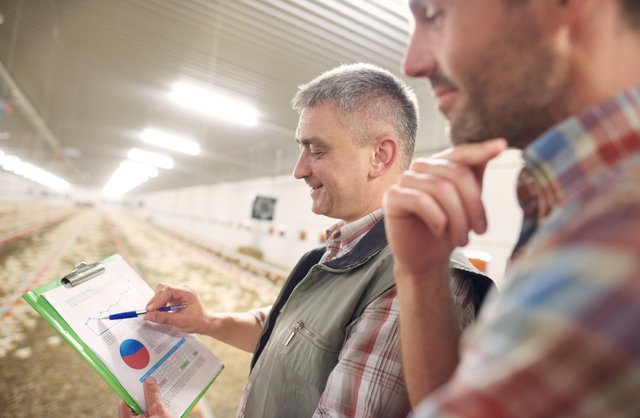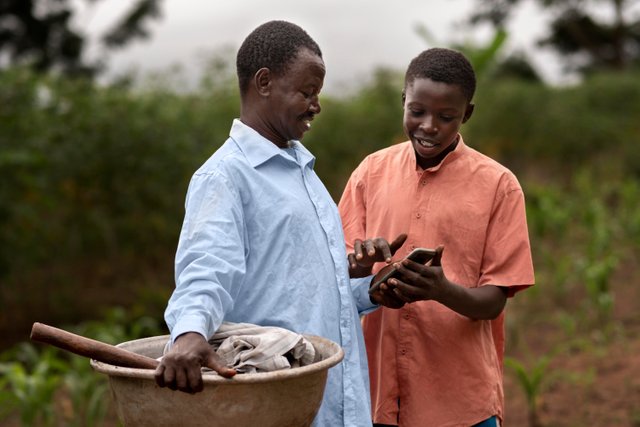| INTRODUCTION |
|---|

When you hear the word agriculture, the first thing that alwy comes to mind is a farmer in the village clearing bush with cutlass and hoe. But agriculture is more than just planting cassava or harvesting yams.
Infact there’s a whole system of knowledge, planning, and decision-making that happens behind before food crops are available for sale and even consumption. That’s where Agricultural Economics comes in.
This topic might not sound as exciting as tractors or greenhouses, but if we’re talking about food, money, policy, and farmer survival — then it is important.
Discuss on Agricultural economics
| What Is Agricultural Economics? |
|---|

Agricultural Economics is simply the study of how people (especially farmers and government) use limited resource like land, water, fertilizer, and labour to grow food and make money from it. It also looks at how food moves from the farm to our plates, how prices are determined, and how decisions are made to improve farming and rural development.
It is the brainwork behind the whole agricultural setup. While farmers are busy on the field, agricultural economists are busy doing the calculations, Trying to figure out things like;
The best crop for the soil
Which farming method will bring profit or loss
Is this year good for maize or better for beans?
Why is food price going up and how do we fix it?
So, instead of guesswork, agricultural economics brings strategy and planning into farming — just like in any successful business.
Importance of Agricultural Economics
| Why Is Agricultural Economics Important in Nigeria? |
|---|
In a country like Nigeria, where hunger and unemployment still disturb many homes, understanding agricultural economics is not a luxury — it’s a necessity. Below are a few solid reasons why:
Smart Decision-Making on Farms
Agricultural economics guides farmers on what to plant, how to plant, and when to plant. If maize is not profitable this season due to excess supply, a good farmer who understands market trends might switch to something else like millet or groundnut.Food Security
Planning ahead is key. If we want to avoid scarcity, we must produce enough food, store it well, and distribute it fairly. That’s where agricultural economists help — through planning, storage forecasts, and market balance.Price Stability
One of the reasons why food prices swing like yo-yo in our markets is poor planning. One day garri is ₦600, next week it’s ₦1,200. Agricultural economics helps us understand the causes of such instability and what can be done to fix it.Better Use of Limited Resources
We don’t have endless supply of land or fertilizer. Agricultural economics helps us use what we have wisely — choosing the best combination of inputs to get maximum output.Helpful Government Policies
Good agricultural policies don’t come from the head of one minister. They should be based on research and real numbers. Agricultural economists provide this background so that government spending, subsidies, and support don’t go to waste.
| One Example That Affected All of Us |
|---|
Remember when Nigeria banned the importation of rice in 2021? That policy didn’t just happen overnight. Economists had to look at data: how much rice we consume, how much we produce, the cost of importation, and the benefits of local farming. The outcome? Many local farmers were encouraged to grow rice, and even though rice became more expensive for a while, local production went up significantly in states like Ebonyi and Kebbi.
The Anchor Borrowers Programme was also introduced to support farmers financially. This kind of planning is one of the many ways agricultural economics works in the real world — even if most people didn’t know it was playing a role.
Challenges Encountered in Agricultural Economics and the possible solutions
| Problems Facing Agricultural Economics in Nigeria |
|---|
As powerful as this field is, there are still some strong roadblocks preventing it from making full impact in our country.
Poor Data and Record Keeping
Most Nigerian farmers don’t keep records. Some don’t even know how much they spend or earn per season. So how can economists analyse or predict anything accurately? Most times they are working on assumptions.Limited Government Investment
Agricultural economists in Nigeria often work with outdated tools or no support at all. Research institutions are underfunded. Even agricultural universities struggle. Without investment, no serious planning can happen.Bad Infrastructure
Imagine a farmer grows 100 baskets of tomatoes in Kano, but more than half gets spoiled before reaching Lagos due to bad roads or no cold storage. Agricultural economists can plan all they want — without good infrastructure, things will still fail.Lack of Farmer Education
Most rural farmers are not exposed to basic economic ideas. They don't understand concepts like “input-output ratio” or “marginal profit”. If you tell a farmer to stop planting cassava because the market is saturated, he may think you are mocking him. There’s a communication gap.Climate Change
The unpredictable weather these days is affecting harvests. Rainy seasons don’t come when expected. Sometimes flood, sometimes drought. This makes economic planning even more difficult.
| Solutions We Can Apply |
|---|

Here are some practical steps we can take to address the issues above:
Digital Tools for Farmers
We need to introduce simple mobile apps and record-keeping tools that even rural farmers can use — possibly in local languages. This will help collect better data and improve decision-making.Invest in Research and Institutions
Government and private sector should put money into research bodies like IITA, ARCN, and the agri-departments in our universities. With better funding, they can support farmers more effectively.Upgrade Infrastructure
Rural roads, storage facilities, and transportation systems need serious improvement. Cold storage trucks, rural warehouses, and good access roads will reduce losses and make economic planning more accurate.Farmer Education Through Extension Officers
Extension services must be revived. Let educated officers visit farmers, not just to teach them how to plant, but also how to make smart economic choices — using simple language and relatable examples.Promote Climate-Smart Farming
Let’s invest in drought-resistant crops, rainwater harvesting, drip irrigation, and early weather alert systems. All these will help make economic planning easier even in the face of climate uncertainty.
| Final Words from Me |
|---|
Agriculture is not just bush work. It’s an economic engine — a serious business that feeds the nation, employs millions, and stabilizes the economy. And without agricultural economics, this engine will run blindly and inefficiently.
As Nigerians, we must begin to respect and invest in this field. We should stop making agricultural decisions based on politics or emotions. Let data, strategy, and knowledge guide our steps. That’s how we’ll truly achieve food security and grow a resilient economy.
| What About You? |
|---|
Have you seen any farming project around you that failed or succeeded due to planning (or lack of it)? Do you think farmers in your area are making informed decisions or just doing trial and error?
Let me hear from you in the comments.
Thank you for reading till the end!
I invite @imohmitch @isha-rehman @us-andrew to participate in this contest.
Hello am Donald from calabar please i would like to buy some steem for my wallet but am having difficulty please can you help me
Downvoting a post can decrease pending rewards and make it less visible. Common reasons:
Submit
https://x.com/Samuel62685837/status/1945828739801084129?t=irsNC6vkfEsGh-Ry5PhNUw&s=19
Downvoting a post can decrease pending rewards and make it less visible. Common reasons:
Submit